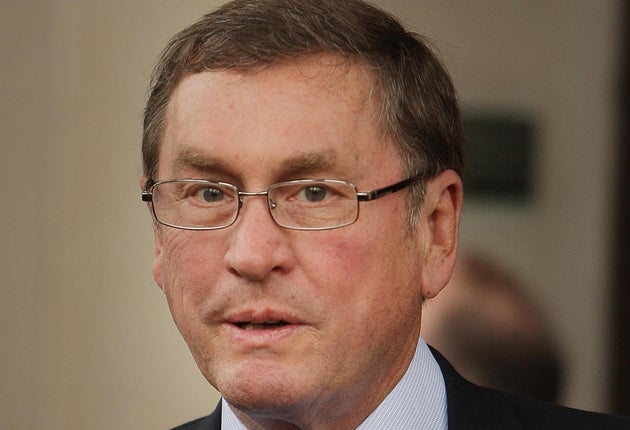Have Ashcroft's millions fatally wounded Tories?
Lead slips in marginals that donor's money was meant to secure

Your support helps us to tell the story
From reproductive rights to climate change to Big Tech, The Independent is on the ground when the story is developing. Whether it's investigating the financials of Elon Musk's pro-Trump PAC or producing our latest documentary, 'The A Word', which shines a light on the American women fighting for reproductive rights, we know how important it is to parse out the facts from the messaging.
At such a critical moment in US history, we need reporters on the ground. Your donation allows us to keep sending journalists to speak to both sides of the story.
The Independent is trusted by Americans across the entire political spectrum. And unlike many other quality news outlets, we choose not to lock Americans out of our reporting and analysis with paywalls. We believe quality journalism should be available to everyone, paid for by those who can afford it.
Your support makes all the difference.For years, Conservative Party officials argued that any controversy surrounding Lord Ashcroft was worth it because his operation in marginal seats would deliver the party its first election victory for 18 years.
When the Tories' lead in the opinion polls started to slip in January, party strategists declared that national figures did not really matter because their deputy chairman's blitz had ensured they were further ahead in the crucial seats that would decide the election.
Such arguments appear to be wearing thin. Some Tory MPs and parliamentary candidates are wondering whether the "Ashcroft effect" is all it has been cracked up to be, after three polls in marginal seats suggested that the battle with Labour is too close for comfort.
Although surveys in marginal seats are viewed with caution by polling experts, the three polls suggest that a hung parliament is more likely than the outright Tory victory the key seats initiative was supposed to cement. The Tories have spent £6m over two years in their target seats.
Some Tory MPs now fear that the row over Lord Ashcroft's "non-domicile" tax status may be partly responsible for narrowing the gap between the parties. "It would be the final irony," one said. "The 'Ashcroft effect' was supposed to be positive, not negative."
Some Tory candidates report that the headlines about the Ashcroft affair may have contributed to the voter disenchantment that they encounter on the doorstep – already at a record high after the MPs' expenses controversy.
The mood at Conservative campaign headquarters is said to be calmer after the most recent national polls suggested that the slide in the party's lead had halted. A Harris survey for Metro newspaper puts the Tories on 37 per cent, Labour on 29 per cent and the Liberal Democrats on 18 per cent.
"We have had a bit of a battering in the past few weeks but we hope the polls have now bottomed out," one Tory source said last night. The Tories point out that the three polls of marginals suggest they would have more MPs than Labour, allowing David Cameron to head a minority government, and do not measure their battle with the Liberal Democrats in their other target seats. Feedback from the front line is said to give Tory officials cautious optimism for winning an overall majority.
The Tory high command has tried to limit the damage from Lord Ashcroft's admission that he is a "non-dom", which allows him to avoid tax in Britain on his foreign income. It has made clear that he will stand down as deputy chairman after the election and would not become a minister if the party wins power. However, the row is rumbling on. Lord Kalms, a former Tory treasurer, said yesterday: "Perhaps David [Cameron] and William [Hague] should have been a little more alert. It is an unpleasant incident ... Just because you can find a way of doing something that is not illegal does not mean you should do it."
Yesterday Lord Taverne, a Liberal Democrat peer, called for an investigation into whether Lord Ashcroft's behaviour has breached the House of Lords code of conduct and principles of standards in public life. Lord Ashcroft had promised to take up permanent residence in the UK as a condition of becoming a peer in 2000 but later changed his undertaking to "long-term".
Lord Taverne said: "If Lord Ashcroft's undertaking was broken, or significantly changed without the House of Lords being informed, that would be a serious breach of the code of conduct."
Lord Paul, whose Caparo Industries steel firm has donated to Labour, announced he would give up his "non-dom" status. He said he would pay full taxes once a new law banning "non-doms" from sitting in parliament takes effect – as Lord Ashcroft has also pledged.
The Labour peer told New Statesman magazine: "I will be paying all the taxes. I will be qualifying to be in the House of Lords ... There are lots of 'non-doms' in the House of Lords but I don't know of any case where they were asked to pay full tax, apart from Lord Ashcroft."
Lord Paul said a Metropolitan Police investigation into his expenses claims had ended without any action being taken against him. However, he could now face a Lords investigation into his claims for overnight allowances.
Join our commenting forum
Join thought-provoking conversations, follow other Independent readers and see their replies
Comments